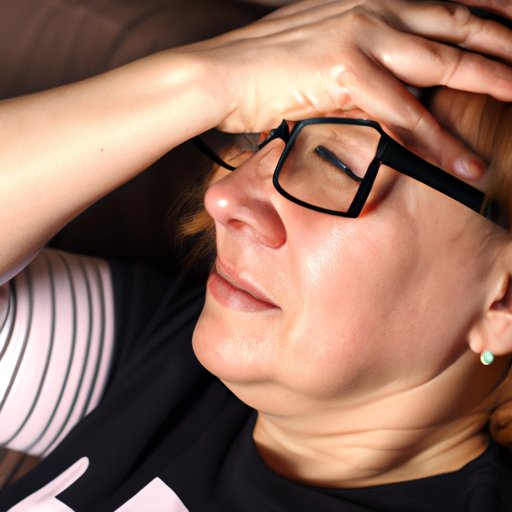
Introduction
Migraines are a common and often debilitating problem that affects millions of people worldwide. Migraines can cause intense pain, nausea, vomiting, and sensitivity to light and sound, which can significantly interfere with a person’s daily activities. The good news is, there are natural remedies, lifestyle changes, medications, mind-body therapy, and cold and heat therapy that can alleviate symptoms fast and effectively. In this article, we will explore these methods and offer tips on how you can relieve migraine symptoms quickly.
Natural Remedies
Many people prefer natural remedies over medications for managing migraine pain and symptoms. Natural remedies work by reducing inflammation, relaxing the muscles, and improving blood flow. Here are some natural remedies to consider:
- Ginger Tea: Ginger has anti-inflammatory and pain-relieving properties that can help to reduce migraines. Drink ginger tea to soothe headaches.
- Lavender Essential Oil: The calming scent of lavender essential oil can help to relieve stress and relax the mind and body, which can reduce migraine symptoms.
- Peppermint Aromatherapy: Peppermint oil has been shown to reduce tension headaches and provide relief to migraines. Apply as a roll-on, or use essential oils in a diffuser.
Lifestyle Changes
Lifestyle changes can make a significant difference in reducing the frequency and severity of migraines. Here are some of the most effective lifestyle changes to consider:
- Managing Stress: Stress is a common trigger for migraines. Practice stress-reducing techniques such as yoga and meditation, or engage in stress management activities, such as reading a book, listening to calming music, or soaking in a hot bath.
- Maintaining a Healthy Diet: Keeping a healthy diet that is low in sugar, processed foods, and alcohol can help to reduce migraines. Foods rich in magnesium such as nuts, seeds, and leafy green vegetables can potentially alleviate migraine symptoms.
- Getting Regular Exercise: Exercise can help reduce the frequency of migraines and improve symptoms during a headache attack. Going for a low-impact walk or practicing yoga are recommended exercise techniques.
- Getting Enough Sleep: A consistent sleep schedule can significantly improve migraine and headache symptoms. Try getting at least 7 hours of sleep every night.
Medications
There are several over-the-counter and prescription medications available to alleviate migraine symptoms. However, medication use should be monitored by a healthcare professional.
- Nonsteroidal Anti-Inflammatory Drugs (NSAIDs): Over-the-counter medications like ibuprofen (Advil, Motrin IB) and aspirin can alleviate migraine symptoms, such as headache and fever.
- Triptans: Triptans are a class of prescription medications designed to alleviate migraines soon after their onset. Sumatriptan (Imitrex, Tosymra) is an example of a triptan drug used for migraines.
- Ergotamine: Ergotamine is another prescription medication used to treat migraines by constricting blood vessels in the brain. Cafergot is a common ergotamine medication.
Mind-Body Therapy
Mind-body therapies can be an effective way to manage migraine pain and symptoms. Here are some mind-body therapies to try:
- Acupuncture: Acupuncture involves the use of needles to stimulate pressure points in the body, which can help to relieve headache and migraine symptoms.
- Yoga: Yoga involves stretching and breathing techniques that can help to reduce stress and relax muscles.
- Meditation: Meditation is a relaxation technique that can help to reduce stress and promote a sense of calm during a migraine attack.
- Deep Breathing Exercises: Deep breathing can reduce stress and calm the body and mind during migraine attacks.
Cold and Heat Therapy
Cold and heat therapy techniques can help to reduce inflammation, increase blood flow, and numb pain in the affected area. Here are some ways to use cold and heat therapy when suffering from migraines:
- Ice Packs: Apply an ice pack to the affected area to reduce inflammation and constrict blood vessels that contribute to migraines.
- Heat Pads: Use a heat pad or warm towel to relax muscles and promote blood flow to the affected area.
Conclusion
Migraines can be a debilitating problem, but natural remedies, lifestyle changes, medications, mind-body therapy, and cold and heat therapy can help alleviate the symptoms quickly and effectively. By experimenting with different methods, you can find the best method to suit your needs and improve your quality of life.





